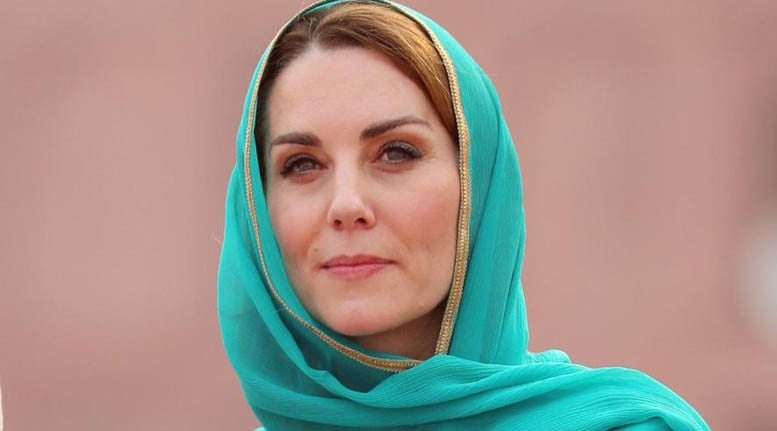
The assumption is that a Pakistani woman should behave in line with the national "culture" in order to avoid harassment, or should opt to speak with empathy to the harassers she is forced to share her space with

Social media platforms allow for voices, thoughts and ideologies by the hundreds to be exclaimed in minutes. Nothing riles Pakistanis more than a debate on what societal values and norms should be. Raised voices and rallying battle cries have become the new mode of conversation - deeply invested in policing Pakistani women’s bodies and criticising their demand for safety and autonomy.
This week on Twitter #RoyalsVisitPakistan has been trending and an overwhelming number of posts boosting the hashtag are comparing the wardrobe choices of Princess Kate Middleton to that of Pakistani actresses. One click will reveal an image juxtaposing Middleton in shalwar kameez with some Pakistani actress in a western outfit. The most frequent comparison is with the latest leaked video of Mehwish Hayat practising for the Hum Awards in a two-piece gym set, and with Mahira Khan smoking a cigarette in a sundress. Khan’s 2017 leaked photo made national breaking news and headlines the day it was released. Most of the posts lauded Middleton for "respecting our culture" while visiting, and maligned Pakistani women in western wear for abandoning it in foreign countries.
The fact that Middleton in any other place in the world assimilates and dresses as she pleases, is rarely pointed out by those captivated by her cultured presence on our soil. Like Princess Diana before her, Middleton is at the receiving end of mass praise for being a white woman in a shalwar kameez, a cultured woman. Tale as old as time: honour and respect of our culture falls on the women who "represent us."
Hayat is a recent recipient of the Tamgha-e-Imtiaz for her contributions and efforts to promote and celebrate Pakistani culture. When it was announced that Hayat would be decorated for her career, the internet made it their goal to tear her down. Hayat’s video in a pink workout outfit made the rounds where people demanded the state take back the award because a real Pakistani woman, a cultured one, would never bare midriff and dance. The demands led to Hayat’s name trending in Pakistan; rape and murder threats followed.
If female Pakistani culture is one where their body and what adorns it is critical in their representation as Pakistanis, what is male Pakistani culture? Our men may dance shirtless in films, pose shirtless on Instagram, but our women? Women of the soil? No, they are not allowed to, it is not our culture.
No fingers are pointed at Pakistani male actors who dress up in western wear or perform dances or smoke cigarettes. In Superstar, Mahira Khan’s co-star Bilal Ashraf is shirtless for an entire dance sequence, there is no layout contrasting him with Prince William. There are no posts with hundreds of likes and comments in agreement about men in Pakistan wearing western outfits, no posts about them harming our culture by donning a pair of jeans.
There is a pretty easy way to incite the passions of men protecting men in Pakistan. Make a ‘Me Too’ accusation against a man or call attention to men on social media. Women have finally taken to recording or photographing incidents of harassment. But where is the courage to call out the men, to blast them on social media. There will be suffocating hoards of men rushing to their defence in the comments; "You could have told him nicely"; "Maybe he is not educated and does not know better"; "What were you wearing?"; "What did you expect?"
The assumption is that a Pakistani woman should behave in line with our "culture" in order to avoid harassment or should opt to speak with empathy to the harassers she is forced to share her space with. She should, most importantly, dress in a way that would discourage her countrymen from targeting her. Even if she is a corpse.
If one is to read the comments by the ‘cultured Pakistani man’ beneath any video a woman was brave enough to share of a harasser she confronted. In other words, look at where you messed up. A cultured Pakistani man blames women when they are hurt, harassed, abused, raped or even killed. He’ll blame his wife for inappropriate advances from his own brother. He polices women, those he knows and those he does not, before even thinking to demand better of the men around him. He is not ruffled by gender pay gaps, rampant sexual harassment, child marriage or forced modesty – he remains indifferent to the plight of half of the population because it does not inconvenience him. A cultured Pakistani man is silent when he walks freely and unhindered while his sisters do not.
The culture and its respect is apparently in no way or form tied to men, just to Pakistan’s womenfolk, and not through their actions or their pride for soil, but whether or not their trousers are made from denim or lawn.